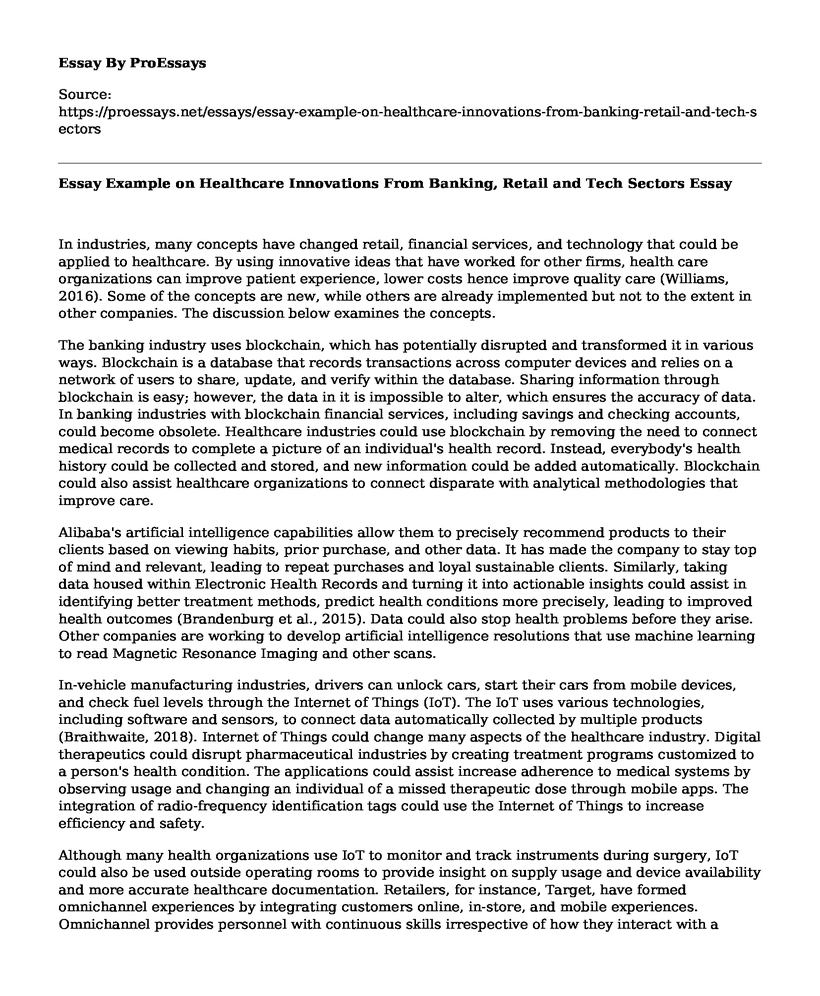In industries, many concepts have changed retail, financial services, and technology that could be applied to healthcare. By using innovative ideas that have worked for other firms, health care organizations can improve patient experience, lower costs hence improve quality care (Williams, 2016). Some of the concepts are new, while others are already implemented but not to the extent in other companies. The discussion below examines the concepts.
The banking industry uses blockchain, which has potentially disrupted and transformed it in various ways. Blockchain is a database that records transactions across computer devices and relies on a network of users to share, update, and verify within the database. Sharing information through blockchain is easy; however, the data in it is impossible to alter, which ensures the accuracy of data. In banking industries with blockchain financial services, including savings and checking accounts, could become obsolete. Healthcare industries could use blockchain by removing the need to connect medical records to complete a picture of an individual's health record. Instead, everybody's health history could be collected and stored, and new information could be added automatically. Blockchain could also assist healthcare organizations to connect disparate with analytical methodologies that improve care.
Alibaba's artificial intelligence capabilities allow them to precisely recommend products to their clients based on viewing habits, prior purchase, and other data. It has made the company to stay top of mind and relevant, leading to repeat purchases and loyal sustainable clients. Similarly, taking data housed within Electronic Health Records and turning it into actionable insights could assist in identifying better treatment methods, predict health conditions more precisely, leading to improved health outcomes (Brandenburg et al., 2015). Data could also stop health problems before they arise. Other companies are working to develop artificial intelligence resolutions that use machine learning to read Magnetic Resonance Imaging and other scans.
In-vehicle manufacturing industries, drivers can unlock cars, start their cars from mobile devices, and check fuel levels through the Internet of Things (IoT). The IoT uses various technologies, including software and sensors, to connect data automatically collected by multiple products (Braithwaite, 2018). Internet of Things could change many aspects of the healthcare industry. Digital therapeutics could disrupt pharmaceutical industries by creating treatment programs customized to a person's health condition. The applications could assist increase adherence to medical systems by observing usage and changing an individual of a missed therapeutic dose through mobile apps. The integration of radio-frequency identification tags could use the Internet of Things to increase efficiency and safety.
Although many health organizations use IoT to monitor and track instruments during surgery, IoT could also be used outside operating rooms to provide insight on supply usage and device availability and more accurate healthcare documentation. Retailers, for instance, Target, have formed omnichannel experiences by integrating customers online, in-store, and mobile experiences. Omnichannel provides personnel with continuous skills irrespective of how they interact with a company (Braithwaite, 2018). Target customers use the app to make shopping lists, browse for coupons, order items on the shopping list, and pick them up after a few hours. Within healthcare organizations, this can be applied to create an omnichannel experience; health organizations must integrate customers' touchpoints by connecting patients call centers, portals, online scheduling systems, and in-person appointments to each other. It allows patients to access care from place and time most convenient to them and creates a more centralized and complete picture of the patient's health information.
Conclusion
For successful innovation of the healthcare market, organizations must plan differently by using lessons learned from other industries to create new models. Healthcare must also think differently by identifying innovative ideas outside the organization. Also, acting inversely by building a healthcare delivery system investing in technology while maximizing the values of the investments. With these factors in consideration, it will increase productivity.
References
Braithwaite, J. (2018). How emerging healthcare technology is changing the workplace. BMJ, 23-124. https://doi.org/10.1136/bmj.k2014
Brandenburg, L., Gabow, P., Steele, G., Toussaint, J., & Tyson, B. J. (2015). Innovation and Best Practices in Health Care Scheduling. NAM Perspectives, 5(2). https://doi.org/10.31478/201502g
Williams, S. J. (2016). Improving Healthcare Systems. Improving Healthcare Operations, 15-27. https://doi.org/10.1007/978-3-319-46913-3_2
Cite this page
Essay Example on Healthcare Innovations From Banking, Retail and Tech Sectors. (2023, Apr 24). Retrieved from https://proessays.net/essays/essay-example-on-healthcare-innovations-from-banking-retail-and-tech-sectors
If you are the original author of this essay and no longer wish to have it published on the ProEssays website, please click below to request its removal:
- Should Ill People Do an Internet Research of Their Condition? Essay
- A Qualitative Data Collection Method Needed to Determine the Source of the Outbreak
- State-Specific Regulations on NPs Paper Example
- Essay Sample on The Evolution of Environmental Thinking in Nursing
- Essay Sample on Cigarette Packaging
- Essay Example on Candice Conway: Severe Peptic Ulcers & Hospitalization
- Essay Example on Clinical Tests: Diagnosing & Treating Diseases for Ira







